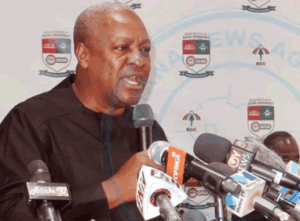NDC says it will introduce pension scheme for informal sector groups

The next National Democratic Congress (NDC) Government will introduce a new Pension Scheme for organised groups in the informal sector of the Ghanaian economy.
“The Government under Mr John Dramani Mahama as the President and Professor Jane Naana Opoku Agyemang as the Vice President will contribute a percentage on behalf of any group that participates in the new informal sector Scheme,” the NDC stated in its Election 2020 Manifesto.
The NDC Election 2020 “People’s Manifesto: Jobs and Prosperity for All,” based on which the party seeks to solicit for the vote of the electorates identified the groups, which qualify for the Organised Group Pension Scheme as the Cocoa and Cashew Farmers.
Other groups are: Driver Unions such as GPRTU, PROTOA and Co-operatives; Ghana Union of Traders Association; Beauticians and Hairdressers Associations; Dressmakers and Tailors Associations; Garages Associations; Artisans Association of Ghana; and Farmers and Fishermen Associations.
On the Insurance Sector, the NDC said if elected to form the next government, judging from the important role the Insurance industry plays in the economic growth of a nation; “we shall adopt a Risk-Based Minimum Capital approach for the industry”.
The NDC explained that the Risk-Based Minimum Capital Insurance Approach is a system whereby minimum capital will be linked to the risks an insurance company carries, instead of the current fixed minimum capital regime.
The next NDC Government will enhance measures towards combating money laundering, terrorist financing, and the proliferation of weapons of mass destruction.
The NDC said it would promote the effective implementation of legal, regulatory, and operational measures for combating money laundering, terrorist financing, and the proliferation of weapons of mass destruction and other related risks at the national level.
The NDC in its Election 2020 Manifesto said it would address the identified strategic deficiencies in Ghana’s measures for combating money laundering, terrorist financing, and the proliferation of weapons of mass destruction system.
The NDC measures would obviate the need for any sanctions or ‘blacklisting’ by the international standard-setting body, or the European Union; resource and capacitate the Financial Intelligence Centre (FIC) as well as other key agencies engaged in the fight against money laundering and terrorist financing.
The next NDC Government would also introduce standardised certification for AMLROs and Heads of Compliance in all financial institutions and fast-track measures for combating money laundering, terrorist financing, and the proliferation of weapons of mass destruction cases, with the setting up of more special courts for financial crimes.
It would ensure better synergy among the FIC, EOCO, and the Judiciary to enhance investigation, asset tracing, and prosecution.
In recognition of the contribution of Co-operatives in the sectors of trade, agriculture, pharmaceutical, transportation, among others, the next NDC Government will work with the Ghana Co-operatives Council to restructure the sector to respond to modern economic and financial needs of communities.
It would empower, support, and build capacities for co-operatives to play key roles in rural and community socio-economic improvements.
The NDC also noted that under the new governance of Mr Mahama, the government would collaborate with the Council and stakeholders of the over 3,500,000 co-operatives in Ghana to review and enact a new co-operatives law.
It said the new law would reposition co-operatives in community financial inclusion, productivity, and socio-economic development, and promote the interest of youth in the formation of co-operatives.
The NDC said: “it will create not only jobs but sustainable and decent jobs so that people can live dignified lives. With this in mind, we set out to develop the People’s Manifesto, a social contract between the NDC and the people of Ghana.
“To make our manifesto-writing process widely consultative and popular, we adopted a bottom-up approach. In addition to internal consultations within the NDC, our grassroots organs engaged their communities and forwarded their expectations for inclusion”.
Source: GNA
